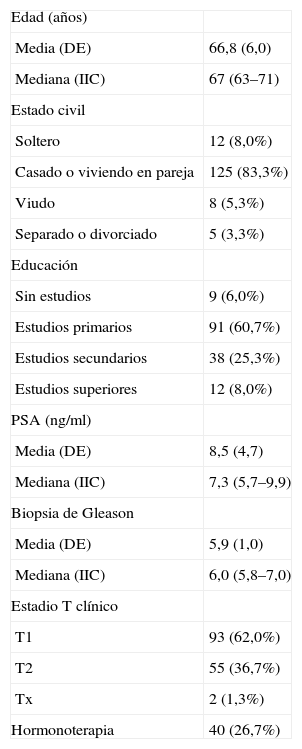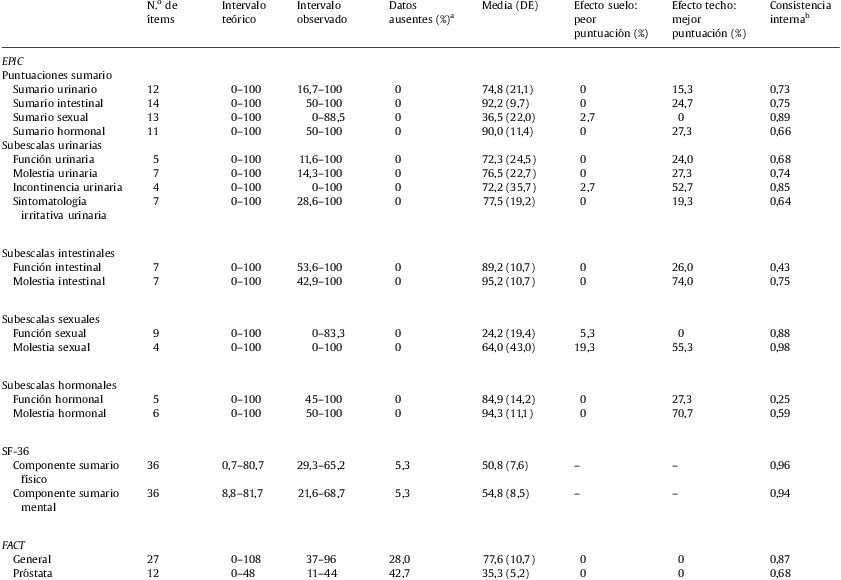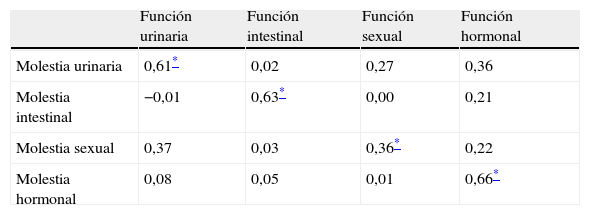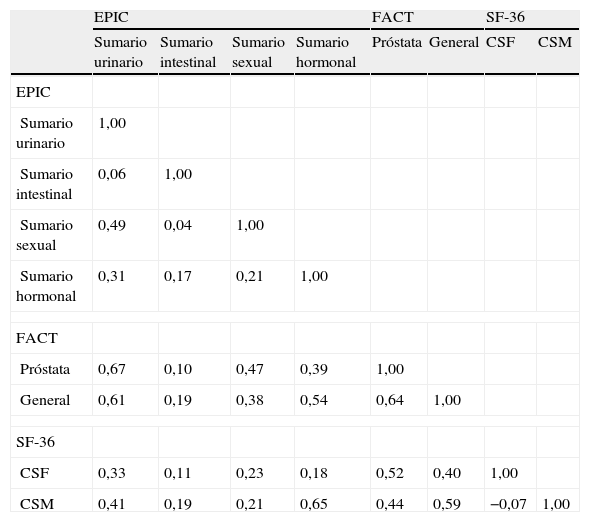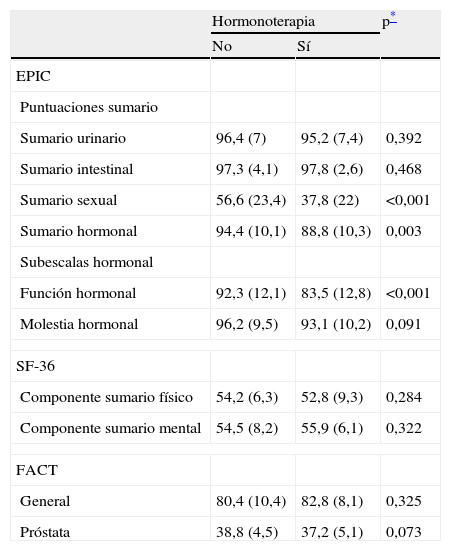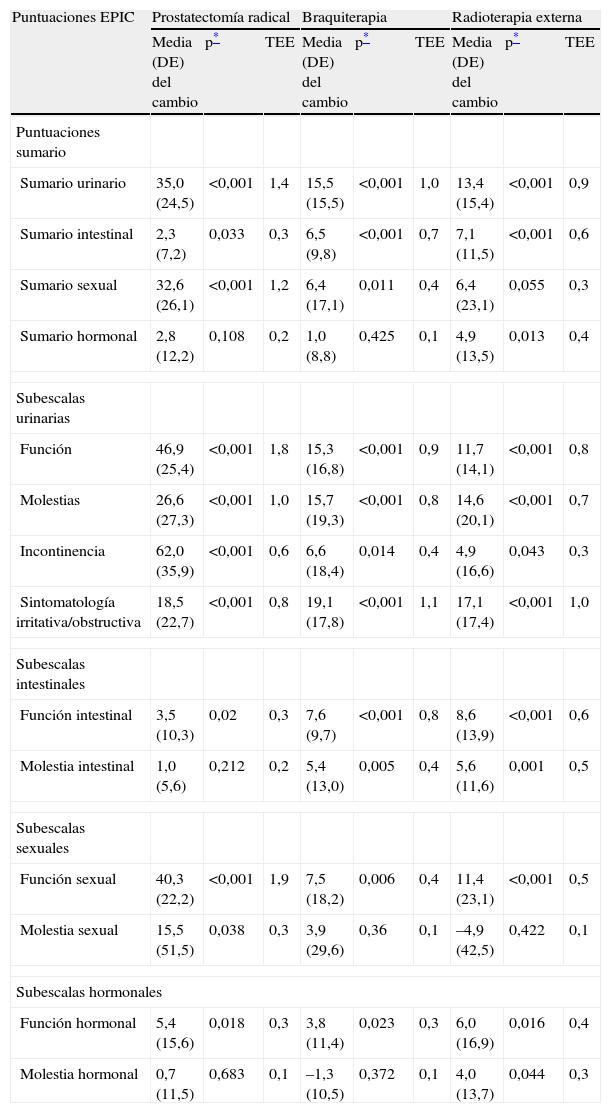el EPIC (Expanded Prostate Cancer Index Composite) es un cuestionario específico para la evaluación del impacto de los tratamientos en la calidad de vida de los pacientes con cáncer de próstata. Contiene 50 ítems divididos en 4 sumarios: urinario, intestinal, sexual y hormonal. El objetivo de este trabajo ha sido adaptar el cuestionario EPIC al español y evaluar sus características métricas.
Métodopara la adaptación se siguió el método de traducción directa-inversa. Las características métricas se evaluaron en 50 pacientes de cada tratamiento —prostatectomía, braquiterapia y radioterapia externa—, a quienes se administraron el EPIC, SF-36 y FACT (Functional Assessment of Cancer Therapy) antes y después de la intervención. Con el coeficiente alfa de Cronbach se evaluó la fiabilidad. La validez de constructo se estudió mediante correlaciones entre subescalas del EPIC y entre cuestionarios, y comparando a los pacientes con y sin hormonoterapia (prueba de la t de Student). Para valorar la sensibilidad al cambio se calculó el tamaño del efecto estandarizado tras la intervención.
Resultadosel alfa de Chronbach de los sumarios del EPIC fue elevado (0,66–0,89). Las correlaciones entre el EPIC y el FACT fueron cercanas o superiores a 0,4. Se encontraron diferencias en los sumarios hormonal y sexual entre los pacientes con y sin hormonoterapia (p<0,01). El tamaño del efecto estandarizado fue grande (>0,8) en los sumarios urinario (3 grupos) y sexual (grupo de prostatectomía), y moderado en el sumario intestinal (0,6 y 0,7) para los 2 grupos de radioterapia.
Conclusionesla versión en castellano del EPIC es fiable y válida, y presenta una sensibilidad al cambio excelente, por lo que resulta una herramienta útil para comparar el impacto en la calidad de vida de los 3 tratamientos.
The EPIC (Expanded Prostate Cancer Index Composite) is a specific questionnaire for patients with prostate cancer designed to evaluate the impact of treatments on their quality of life. It contains 50 items divided in 4 summaries: urinary, intestinal, sexual and hormonal. The objective was to adapt the EPIC to Spanish and to evaluate its metric characteristics.
MethodThe method followed for the adaptation included translation and back-translation. The metric characteristics were evaluated in 50 patients from each treatment —prostatectomy, brachytherapy and external radiotherapy—, all of whom were administered the EPIC, SF-36 and FACT (Functional Assessment of Cancer Therapy) pre and post intervention. Reliability was evaluated with the Cronbach alpha coefficient. Construct validity was assessed by means of correlations between subscales of the EPIC and questionnaires, and comparing the patients with and without hormonal therapy (T-test). In order to value sensitivity to change, the standardized effect size was calculated after the intervention.
ResultsThe Cronbach's alpha of the EPIC summaries was high (0.66–0.89). The correlations between the EPIC and the FACT were near or higher than 0.4. Differences were found in the hormonal and sexual summaries between the patients with and without hormonal therapy (p<0.01). The standardized effect size was large (>0.8) in the urinary (3 groups) and sexual (group of prostatectomy) summary, and moderate in the intestinal summary (0.6 and 0.7) for the 2 groups of radiotherapy.
ConclusionsThe Spanish version of the EPIC is reliable, valid and presents an excellent sensitivity to change, being a useful tool to compare the impact in the quality of life of the 3 treatments.
Artículo
Comprando el artículo el PDF del mismo podrá ser descargado
Precio 19,34 €
Comprar ahora






